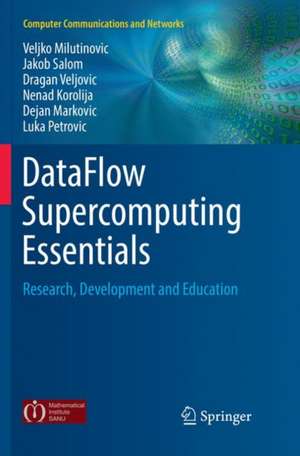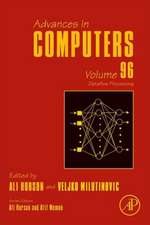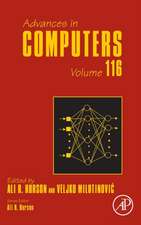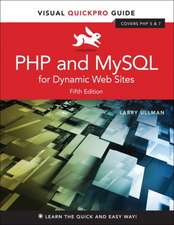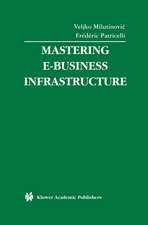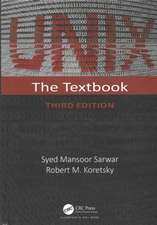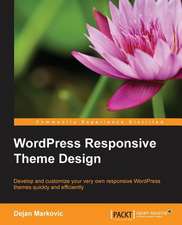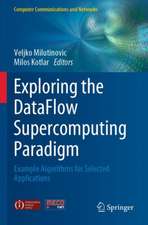DataFlow Supercomputing Essentials: Research, Development and Education: Computer Communications and Networks
Autor Veljko Milutinovic, Jakob Salom, Dragan Veljovic, Nenad Korolija, Dejan Markovic, Luka Petrovicen Limba Engleză Paperback – 25 aug 2018
This work serves as a companion title to DataFlow Supercomputing Essentials: Algorithms, Applications and Implementations, which reviews the key algorithms in this area, and provides useful examples.
Topics and features: reviews the library of tools, applications, and source code available to support DataFlow programming; discusses the enhancements to DataFlow computing yielded by small hardware changes, different compilation techniques, debugging, and optimizing tools; examines when a DataFlow architecture is best applied, and for which types of calculation; describes how converting applications to a DataFlow representation can result in an acceleration in performance, while reducing the power consumption; explains how to implement a DataFlow application on Maxeler hardware architecture, with links to a video tutorial series available online.
This enlightening volume will be of great interest to all researchers investigating supercomputing in general, and DataFlow computing in particular. Advanced undergraduate and graduate students involved in courses on Data Mining, Microprocessor Systems, and VLSI Systems, will also find the book to be a helpful reference.
| Toate formatele și edițiile | Preț | Express |
|---|---|---|
| Paperback (1) | 582.54 lei 38-45 zile | |
| Springer International Publishing – 25 aug 2018 | 582.54 lei 38-45 zile | |
| Hardback (1) | 646.80 lei 3-5 săpt. | |
| Springer International Publishing – 16 noi 2017 | 646.80 lei 3-5 săpt. |
Din seria Computer Communications and Networks
- 20%
 Preț: 378.18 lei
Preț: 378.18 lei - 20%
 Preț: 684.74 lei
Preț: 684.74 lei - 20%
 Preț: 218.21 lei
Preț: 218.21 lei - 20%
 Preț: 1013.39 lei
Preț: 1013.39 lei - 20%
 Preț: 368.78 lei
Preț: 368.78 lei - 20%
 Preț: 505.48 lei
Preț: 505.48 lei - 20%
 Preț: 646.80 lei
Preț: 646.80 lei - 20%
 Preț: 609.08 lei
Preț: 609.08 lei - 20%
 Preț: 765.60 lei
Preț: 765.60 lei - 20%
 Preț: 339.47 lei
Preț: 339.47 lei - 20%
 Preț: 597.29 lei
Preț: 597.29 lei - 20%
 Preț: 655.85 lei
Preț: 655.85 lei - 20%
 Preț: 997.06 lei
Preț: 997.06 lei - 20%
 Preț: 351.89 lei
Preț: 351.89 lei - 20%
 Preț: 902.00 lei
Preț: 902.00 lei - 20%
 Preț: 996.22 lei
Preț: 996.22 lei - 20%
 Preț: 644.81 lei
Preț: 644.81 lei - 15%
 Preț: 650.69 lei
Preț: 650.69 lei - 20%
 Preț: 650.73 lei
Preț: 650.73 lei - 20%
 Preț: 373.91 lei
Preț: 373.91 lei - 20%
 Preț: 646.95 lei
Preț: 646.95 lei - 20%
 Preț: 1004.99 lei
Preț: 1004.99 lei - 20%
 Preț: 646.80 lei
Preț: 646.80 lei - 20%
 Preț: 341.81 lei
Preț: 341.81 lei - 20%
 Preț: 656.19 lei
Preț: 656.19 lei - 20%
 Preț: 651.75 lei
Preț: 651.75 lei - 20%
 Preț: 331.08 lei
Preț: 331.08 lei - 20%
 Preț: 650.40 lei
Preț: 650.40 lei - 20%
 Preț: 988.66 lei
Preț: 988.66 lei - 20%
 Preț: 643.97 lei
Preț: 643.97 lei - 20%
 Preț: 761.44 lei
Preț: 761.44 lei - 20%
 Preț: 332.71 lei
Preț: 332.71 lei - 20%
 Preț: 345.59 lei
Preț: 345.59 lei - 20%
 Preț: 332.06 lei
Preț: 332.06 lei - 20%
 Preț: 996.22 lei
Preț: 996.22 lei - 20%
 Preț: 644.15 lei
Preț: 644.15 lei - 20%
 Preț: 326.64 lei
Preț: 326.64 lei - 20%
 Preț: 320.19 lei
Preț: 320.19 lei - 20%
 Preț: 1013.06 lei
Preț: 1013.06 lei - 20%
 Preț: 642.52 lei
Preț: 642.52 lei - 20%
 Preț: 641.01 lei
Preț: 641.01 lei - 20%
 Preț: 718.56 lei
Preț: 718.56 lei - 20%
 Preț: 1043.41 lei
Preț: 1043.41 lei
Preț: 582.54 lei
Preț vechi: 728.18 lei
-20% Nou
Puncte Express: 874
Preț estimativ în valută:
111.47€ • 116.38$ • 92.25£
111.47€ • 116.38$ • 92.25£
Carte tipărită la comandă
Livrare economică 31 martie-07 aprilie
Preluare comenzi: 021 569.72.76
Specificații
ISBN-13: 9783319881843
ISBN-10: 3319881841
Pagini: 150
Ilustrații: XI, 150 p. 71 illus., 63 illus. in color.
Dimensiuni: 155 x 235 mm
Ediția:Softcover reprint of the original 1st ed. 2017
Editura: Springer International Publishing
Colecția Springer
Seria Computer Communications and Networks
Locul publicării:Cham, Switzerland
ISBN-10: 3319881841
Pagini: 150
Ilustrații: XI, 150 p. 71 illus., 63 illus. in color.
Dimensiuni: 155 x 235 mm
Ediția:Softcover reprint of the original 1st ed. 2017
Editura: Springer International Publishing
Colecția Springer
Seria Computer Communications and Networks
Locul publicării:Cham, Switzerland
Cuprins
Part I Research.- Maxeler AppGallery Revisited.- Discrepancy Reduction Between the Topology of DataFlow Graph and the Topology of FPGA Structure.- Part II Development.- Polynomial and Rational Functions.- Transforming Applications from the Control Flow to the DataFlow Paradigm.- Part III Education.- Mini Tutorial.
Textul de pe ultima copertă
This informative text/reference highlights the potential of DataFlow computing in research requiring high speeds, low power requirements, and high precision, while also benefiting from a reduction in the size of the equipment. The cutting-edge research and implementation case studies provided in this book will help the reader to develop their practical understanding of the advantages and unique features of this methodology.
This work serves as a companion title to DataFlow Supercomputing Essentials: Algorithms, Applications and Implementations, which reviews the key algorithms in this area, and provides useful examples.
Topics and features:
This work serves as a companion title to DataFlow Supercomputing Essentials: Algorithms, Applications and Implementations, which reviews the key algorithms in this area, and provides useful examples.
Topics and features:
- Reviews the library of tools, applications, and source code available to support DataFlow programming
- Discusses the enhancements to DataFlow computing yielded by small hardware changes, different compilation techniques, debugging, and optimizing tools
- Examines when a DataFlow architecture is best applied, and for which types of calculation
- Describes how converting applications to a DataFlow representation can result in an acceleration in performance, while reducing the power consumption
- Explains how to implement a DataFlow application on Maxeler hardware architecture, with links to a video tutorial series available online
Caracteristici
Reviews the advantages of the DataFlow paradigm for supercomputing Introduces the DataFlow programming model Provides a selection of research analyses, implementation case studies, and tutorials on DataFlow computing
